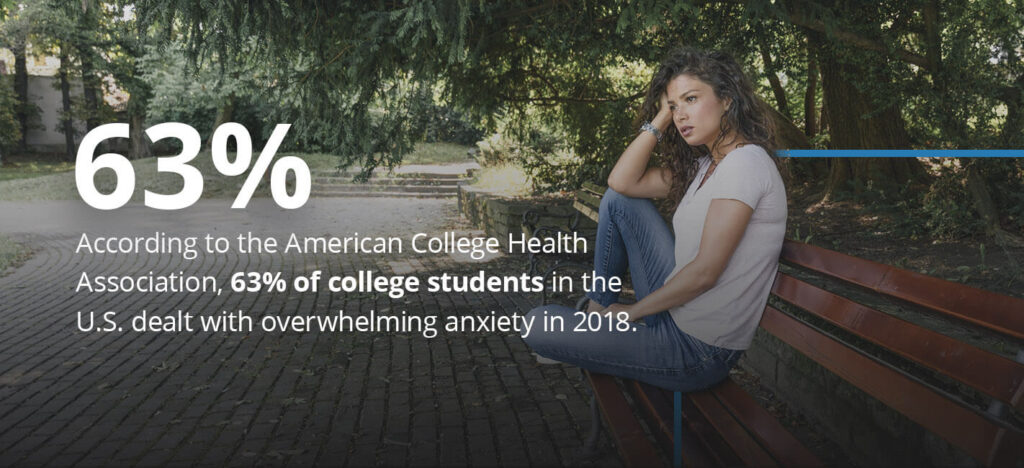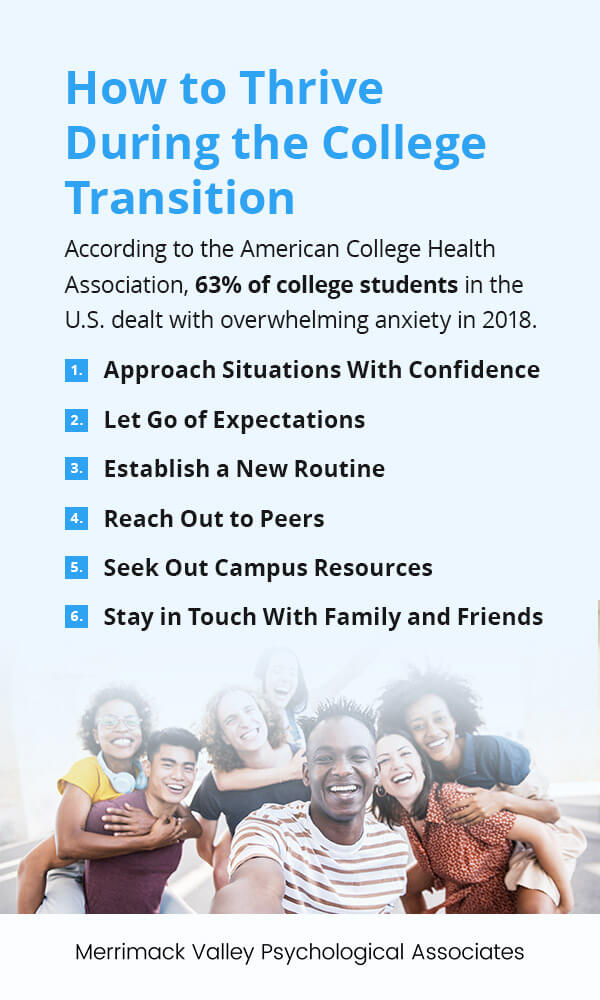Graduating high school and entering college can be an exciting yet challenging transition for students. The first year can be especially difficult, as many miss friends and family or become anxious about what the future may hold. Some may be concerned about making new friends or joining clubs and maintaining their grades.
These are all common anxieties when starting college, and it can be easy to feel lost or overwhelmed by the changes. Below, we’ll guide you through a list of these roadblocks, ways to cope with these feelings and how to master the college transition.
The College Transition
We’re often told college is supposed to be one of the greatest times in our lives. For the most part, it can be an exciting time — you explore new environments, make friends and discover new things about yourself. However, the transition period is another side of college that’s not often discussed enough.
According to the American College Health Association, 63% of college students in the U.S. dealt with overwhelming anxiety in 2018. In the matter of a few days, college students separate from their homes and support systems of family and friends and enter an entirely new environment. They face new challenges, such as managing heavy workloads, living with roommates and developing an independent identity. It’s no surprise that anxiety often spikes during the college transition period.
Change occurs in every facet of life. We change jobs, schools, homes and relationships throughout our lives — it’s inevitable. Learning how to cope with these changes and transition healthily is an important life skill. This is especially helpful in college, where many of these changes happen. While it’s not always easy, establishing these skills can significantly improve your college experience for a smoother transition.
6 Common Roadblocks in the College Transition
While beginning college brings exciting changes, many students face several roadblocks during the transition. The good news is that you can prevent or manage a difficult college transition by learning about these setbacks. Keep reading to learn more about common issues and get tips for starting college with the right mindset.
1. Homesickness and Loneliness
For most students, college is the first time they will be away from friends and family for an extended period. The transition can feel isolating as you enter a new world and lose familiar routines and structures. However, it can be helpful to know that you are not alone.
Loneliness affects nearly two-thirds of college students today. You might be unable to make it home for certain holidays or family events. Some parents may divorce or make significant changes. You might miss your pets and the places and faces you’ve grown to love in your hometown.
Seeking counseling services on campus can help you address your feelings and transition from being away from friends and family for the first time. Joining clubs and reaching out to roommates or dormmates are also great ways to reduce loneliness. In many cases, just giving yourself a few weeks or months to adjust and acclimate to your new environment is highly beneficial.
2. Uncertainty About the Future
While some students enter college with a set plan for their future careers, others aren’t so sure. If you are in the latter position, know that this is common. Many people enter college declaring an undecided major, meaning they’re unsure what they want to study or pursue as a career.
Instead of feeling overwhelmed at this time, it can help to alter your perspective. See your first year of college as an opportunity to explore your interests and learn more about yourself.
Talk to your advisor or professors about your options and start exploring these paths. After all, your first year mainly consists of broader subjects and developing soft skills. You have plenty of time to narrow your options and lots of people and college resources to confide in along the way, so remember to take things day by day.
3. Poor Time Management and Organization
Many students find it challenging to manage their time and stay organized during their first year. This is a common issue, as you may have grown accustomed to the structure that high school and your parents have provided since you were younger. You might also face difficulties juggling new student clubs, friends, work and school all at once.
Preparing for these challenges is the best way to prevent them. Try writing down everything you do in the typical week and how much time each task takes. This will give you a more realistic view to manage your time and prioritize. Many colleges also have in-person and online resources to assist students with time management. Once you find the right balance with your obligations, you’ll find it much easier to enjoy your college experience.
4. Learning Independence
College sets the stage for independence and maturation. While getting your first taste of freedom away from supervision can be thrilling, many find it daunting during their first year. Suddenly, it’s all on you to manage your time and care for yourself physically and mentally. It can help to prepare for the necessary details you’ll need in challenging situations, such as when you get sick for the first time and your parents aren’t around to help.
A few things to plan for might include gathering critical information, such as your health insurance, banking information and social security number. You might also set aside funds for car or health emergencies. Ensuring you have transportation or people to contact in a medical emergency is essential.
Things can go wrong during your transition to college, and in many cases, it’s not your fault. Being independent is learning how to deal with these situations when they arise. Listing what you need ahead of time will significantly benefit you in a crisis or when you’re feeling sick. Remember to be gentle with yourself as you grow, mature and find your independence in college and beyond.
5. Academic Challenges
Upon entering college, some students experience their first academic challenges, such as:
- Reduced academic performance: Many students who did well in high school may find college courses much more demanding. Students are expected to learn each professor’s expectations and grading styles, which can be difficult initially.
- Poor study habits: Since there is no one to force a student to study, go to class or get a good night’s rest, you are expected to create healthy habits that work for you. This can be challenging, and some might feel lost throughout the transition.
- Large classes and inexperience: You might also find the larger courses and class sizes overwhelming. You might feel like the youngest in your class or the least experienced in the subject matter. This can be a significant shift for students used to being the oldest and brightest.
- Unmet expectations: Others may feel their professors or classes are not as exciting and challenging as expected. You might worry you’ve chosen the wrong major or educational path, which can cause anxiety and uncertainty.
It can be challenging to set your own schedule and maintain good grades when you’re on your own for the first time. Fortunately, advisors, counselors and tutors can help. For instance, you might require additional help in writing, grammar or spelling. At the same time, counselors can help you gain self-esteem if you experience anxiety about your academic performance.
6. Relationship Difficulties
One of the primary roadblocks in the college transition is relationship difficulties, such as trouble making friends or clashing lifestyle differences among roommates. Examples of these issues and possible solutions include:
- Trouble making friends and leaving old ones behind: Students entering college often say goodbye to childhood friends and find it hard to keep in touch. Many find this transition isolating, but joining school clubs or taking on-campus jobs can help you meet people and form new relationships to reduce that loneliness.
- Meeting people of various backgrounds: Students will be confronted with people from various backgrounds. They’ll discover people from different backgrounds and various cultures, races, sexualities, religions and values. While it can be overwhelming to start over with new people, accepting people with backgrounds different from yours helps you grow, broaden your perspective or even develop a new identity.
- Roommates with different lifestyles: When you enter dorm life, you might find it challenging to live with a new person. Roommates often have different values, lifestyles and ways of doing things. While you may establish fast friendships with your roommates, others might be messy, noisy or unreliable. In these cases, resident assistants (RAs) are trained to help you with this process. They might help you resolve issues with proper communication or switch your living arrangements if a situation becomes intolerable.
How to Thrive During the College Transition
There are several steps you can take to thrive during the college transition. Try out a few of these tips to survive your freshman year of college and feel optimistic about the changes.
1. Approach Situations With Confidence
It can be challenging to learn how to handle the college transition. Some may embrace it fully with excitement. Others struggle and need time to adjust. It’s OK to be on either side and sometimes feel a little of both. Avoiding stressors by staying in bed or skipping classes can be tempting, but avoidance tends to increase stress over time.
Rather than avoiding the stress, take small steps to approach the more challenging situations. If you find a class particularly difficult, try emailing your professor for help. If you feel isolated, try introducing yourself to someone in your dorm. Take small steps every day to help you thrive during college.
2. Let Go of Expectations
Our culture sets expectations that college will be fun, carefree and full of opportunities to meet new people. But having these expectations can put pressure on you to do everything the “right” way. You might feel disappointed if college doesn’t turn out the way you expected.
Before transitioning to college, try letting go of these expectations and enjoy living in the moment.
2. Establish a New Routine
Routine helps us in times of uncertainty and stress. Try to create a new routine within your first few weeks on campus. Make an effort to plan out times to study and complete assignments. And, as always, stick to regular healthy meals and a consistent sleep schedule.
3. Reach Out to Peers
Some students are eager to meet new people, while others are more nervous about it. Whether you’re excited or cautious, it’s important to establish meaningful connections with others to reduce loneliness and lower your risk of depression.
Try talking to people in your classes or meeting up with people from your dorm for a night out. If you run into difficulties, try a few of these tips:
- Join a club that sparks your interests.
- Attend on-campus events.
- Form or join a study group for one of your classes.
- Host a game night or event in your dorm.
4. Seek Out Campus Resources
Your college should have available resources to help you transition to college. Visit the tutoring center for help with your classes, or talk to student life representatives to help you find clubs you can join. Talk to your RA about dorm life. Ask your advisor about scheduling issues or changes and reach out to professors for help in classes.
If needed, check out the mental health offerings on campus. Attending therapy when starting college can be especially beneficial when you may be most at risk of depression and anxiety. Counselors can help you learn how to master the college transition and feel better about your situation.
Colleges understand the big adjustment you’re undergoing in life and want to help you succeed. Take advantage of your resources to thrive in your new setting.
5. Stay in Touch With Family and Friends
Just because you leave home for college doesn’t mean you can’t stay in touch with family and friends. Maintain these relationships by texting, calling or video chatting. It can be extremely comforting to talk with familiar people when things change around you. If you have a mentor or family member who always has good advice, they might even provide tips for the college transition.
Consider Professional Support During College Transition
Just as it’s essential to eat healthily and get adequate sleep, taking care of your mental well-being is vital during the college transition. Going to therapy during college can help you manage the college transition a little easier when you need extra assistance. Studies show over 41% of students attended therapy during college in 2018.
Merrimack Valley Psychological Associates provides a highly trained team of therapists who will listen to your concerns without judgment and provide support. Our mental health professionals in Andover, Massachusetts, can help you learn how to handle the college transition by pointing out healthy coping mechanisms. We can also help you build a resilient attitude about the changes in your life so you can enjoy a more meaningful college experience.
Contact Us For Mental Health Services in Andover, MA
You might experience roadblocks in the college transition, such as anxiety and depression. Therapy when starting college can help improve your mental health and survive the college transition.
If you’re beginning the transition to college, Merrimack Valley Psychological Associates in Andover is here. Our mental health professionals can help you manage the stress, loneliness or uncertainties you might have, whether in person or through teleconference. We specialize in treating college students navigating significant life changes.
Contact us today to learn more about our services and how we can help you manage the college transition.





